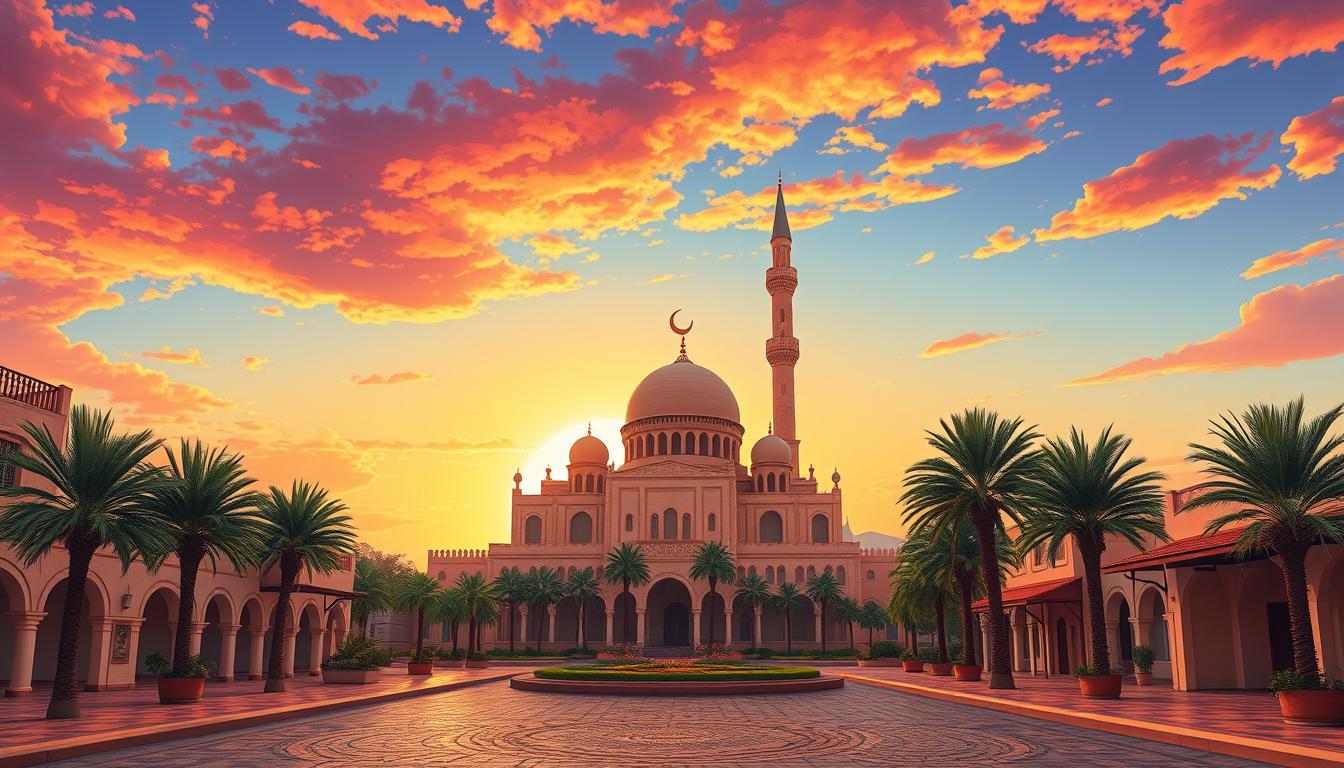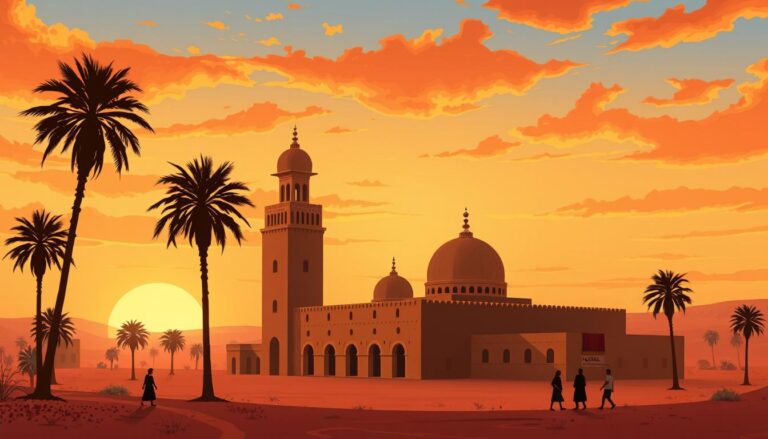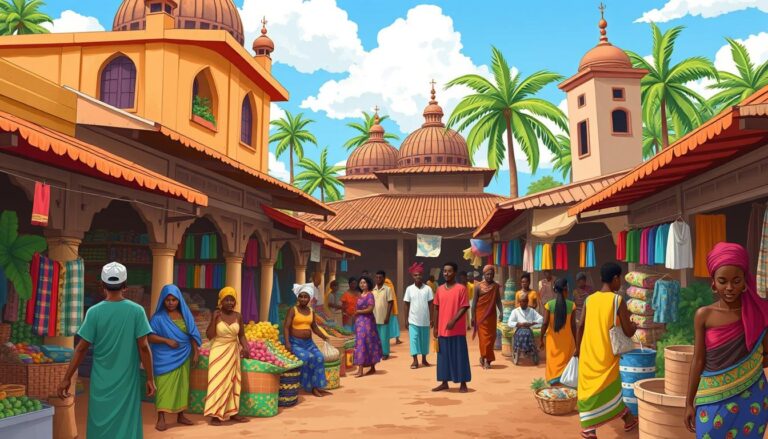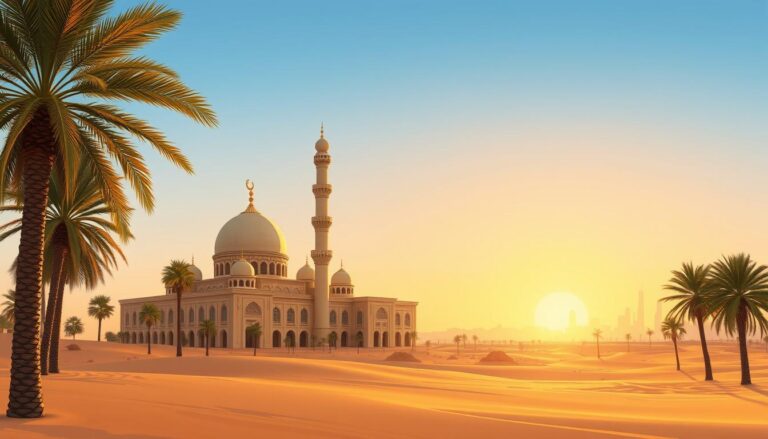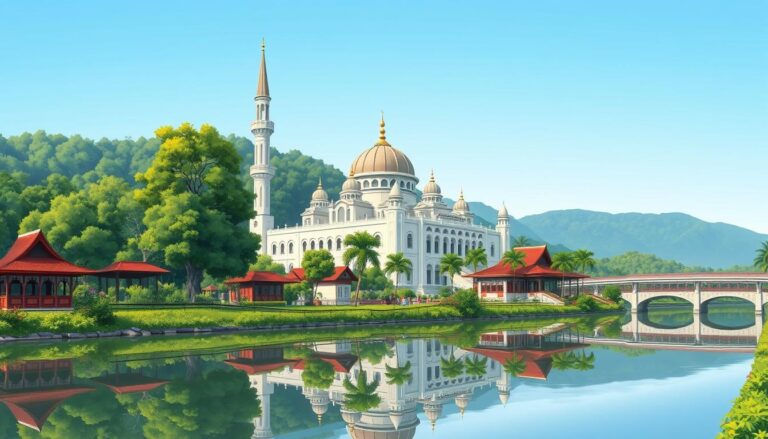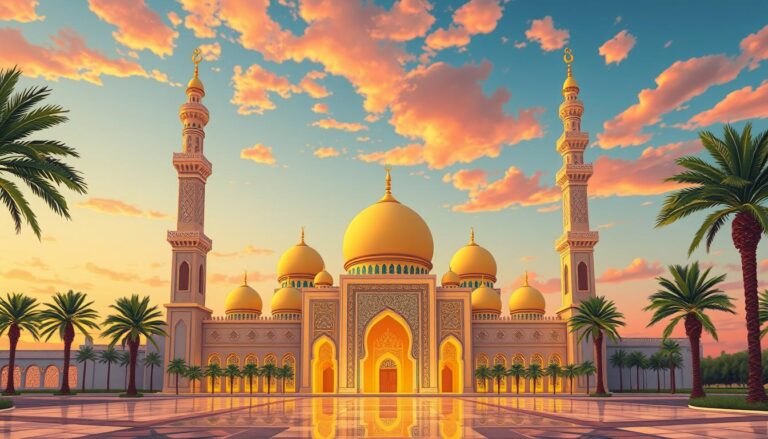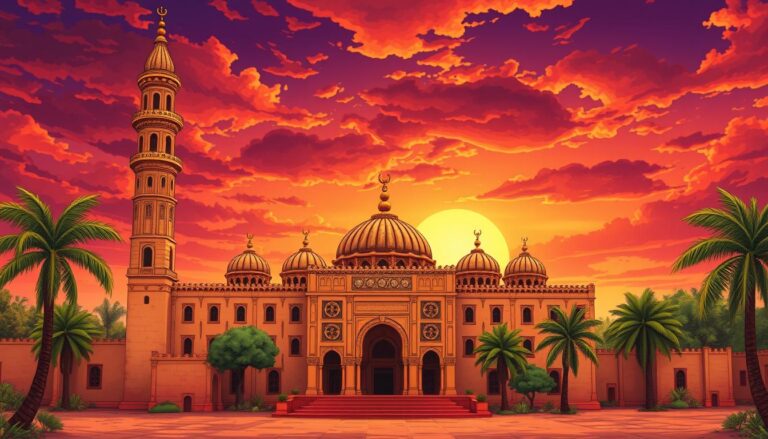Islam in Tunisia
Islam is the main religion in Tunisia, with about 99% of people calling themselves Muslim. The country’s Islamic history goes back to the 7th century AD, when the Umayyad Caliphate ruled. The Mosque of Uqba, also known as the Great Mosque of Kairouan, is a stunning example of Islamic art and architecture.
It’s the oldest mosque in the Muslim West. The Zitouna mosque-university, started around 703 AD, became a key place for Islamic learning and preaching in Tunisia.
Introduction to Islam in Tunisia
Islam has a rich history in Tunisia, starting in the 7th century AD. The Umayyad Caliphate first brought Islam to the region. Important mosques like the Mosque of Uqba and the Zitouna mosque-university made Tunisia a key center for Islamic learning. Understanding Islam’s role in Tunisian society and culture is key, as it influences the country’s social, political, and legal aspects.
Brief overview of Islam’s history and significance in Tunisia
The Arab conquest of Ifriqiya (Tunisia) started in 670, led by Uqba ibn Nafi. The Muslim armies defeated the Berbers and took control of the region. By the end of the 7th century, most Tunisians had converted to Islam, with the Berbers helping spread the faith.
The Umayyad Caliphate, ruling from 661 to 750, was crucial in building Islamic institutions in Tunisia. The Mosque of Uqba in Kairouan and the Zitouna mosque-university in Tunis were major achievements. They made Tunisia a hub of Islamic culture and scholarship in the Maghreb.
“The Berbers chose to ally with the Arabs over Europe, seeing Islam as a means of national liberation and territorial independence.”
Importance of understanding the role of Islam in Tunisian society and culture
Islam deeply influences Tunisian society, culture, and politics. It shapes the legal system, social norms, and cultural practices. Understanding Islam’s role in Tunisia is vital for grasping the country’s unique identity and the complexities of its social and political landscape.
- Islam has been integral to Tunisian identity for over 13 centuries.
- The Zitouna mosque-university in Tunis is a renowned center of Islamic learning and scholarship.
- The Maliki school of Islamic jurisprudence is the dominant legal tradition in Tunisia.
Demographics of Islam in Tunisia
Tunisia, a North African country, has a mostly Muslim population. The United States CIA reports that 99.1% of Tunisia’s 11.8 million people are Sunni Muslims. This shows how deeply Sunni Islam influences Tunisian society and culture.
While Sunni Islam is the main religion, Tunisia also has other Islamic sects. The Ibadi Muslim community is mostly found on Djerba Island. There are also very few Shia Muslims, making up about 0.10% of the population.
But Tunisia’s religious diversity goes beyond Islam. There’s a small but important Christian community, mostly Protestants and Catholics, making up 0.20% of the population. The Jewish community in Tunisia, mainly in Tunis and Djerba, is about 0.02% of the total population.
Even though most Tunisians are Sunni Muslims, the country’s religious scene is diverse. It includes various Islamic sects and other faiths. This diversity enriches Tunisia’s culture.
Islam as the State Religion
Tunisia’s constitution makes it clear that Islam is the state religion. This shows the strong connection between the country’s faith and culture. The constitution says Tunisia’s religion is Islam and calls the government its protector.
This shows how important Islam is in Tunisia’s politics and government. The president must be Muslim, showing Islam’s role in leadership. The government also controls religious affairs, like choosing the Grand Mufti and overseeing mosques.
“The religion of Tunisia is Islam, and the state is the guardian of religion. It guarantees freedom of conscience and belief, the free exercise of religious practices and the neutrality of mosques and places of worship from all partisan instrumentalisation.”
Even though Tunisia tries to be open to all faiths, Islam’s role as the state religion affects the government and president. This bond between the state and Islam influences Tunisia’s politics, laws, and social life.
Sunni Islam in Tunisia
Sunni Islam is the main form of Islam in Tunisia, with about 98% of people identifying as Sunni Muslims. The Aghlabid dynasty, ruling from the 9th to the 10th century, helped spread and solidify Sunni Islam in the country.
The 2014 Constitution of Tunisia makes Islam the state religion. This affects the president and government’s role in religious matters. Sunni Islam deeply influences Tunisian laws, social norms, and cultural traditions.
- Daily prayers, fasting during Ramadan, and charity (zakat) are key parts of life for many Tunisian Sunni Muslims.
- Religious education, including Quranic studies, is part of the school curriculum. Many young people also attend Quranic schools.
- Tunisia struggles with radicalization and terrorism. The government and civil society work to promote a moderate and tolerant Sunni Islam.
The Maliki school of Islamic jurisprudence is the main school of thought in Tunisia. It shapes the country’s laws and social norms. Sufism, a mystical tradition within Sunni Islam, also has a big impact in Tunisian society.
“The Sunni Islam in Tunisia is deeply rooted in the country’s history and culture, shaping the daily lives and social norms of the majority of the population.”
Maliki School of Islamic Jurisprudence
The Maliki school of Islamic jurisprudence, also known as Malikism, is the main school in Tunisia. It was founded by Malik ibn Anas in the 8th century. This school has greatly influenced Tunisia’s laws and social norms.
Dominance of the Maliki School in Tunisia
The Maliki school’s impact in Tunisia started in the 9th century. The Mosque of Uqba in Kairouan became a key place for Maliki teachings. Over time, Maliki’s view of Sharia law became a big part of Tunisian civil law, especially in personal and family issues.
Influence on Tunisian Laws and Social Norms
The Maliki school of Islam in Tunisia has greatly shaped the country’s laws and society. The Maliki influence on Tunisian laws and society is clear in how Sharia principles are used in life. This includes personal and family matters, as well as social customs and traditions.
“The Maliki school of Islamic jurisprudence has been the predominant legal tradition in Tunisia for centuries, shaping the country’s laws and social norms in profound ways.”
Even though the Maliki school has faced challenges from Salafi movements and changing society, its influence is still strong. It remains a key part of Tunisian culture and continues to shape the country’s laws and social norms.
Sufi Traditions in Tunisia
In Tunisia, Sufism is a small but significant part of the Muslim community. It has deeply influenced the country’s Sufi traditions. Many Sufis left after independence, when their buildings and land were taken by the government.
But Sufi traditions still shine during Ramadan festivals. Sufis entertain the public with religious dances. This shows how Sufism’s impact is still felt in Tunisian Islam.
History and Influence of Sufism in Tunisia
Sufism has a long history in Tunisia, starting in the 11th century. Sufi zawiyas were key in spreading Islam and education. They also led resistance against colonial rule.
Today, Sufism remains important in Tunisian culture and society. Women are especially active in Sufi practices and shrines.
The Mouled Festival in Kairouan draws over a million people. It boosts jobs and strengthens community bonds. The festival’s music, with bands of up to eighty, is a highlight.
“Sufi music has witnessed a resurgence in recent years in Tunisia, with the tradition of balancing tradition and culture with contemporary aspects evident in the use of electric guitars and keyboards alongside traditional instruments during the Mouled Festival.”
Despite challenges from hardline Salafi groups, Sufism in Tunisia is thriving. These groups have taken over most mosques and damaged Sufi sites. Yet, Sufi traditions remain a vital part of Tunisia’s culture and spirituality.
Islam in Tunisia
Islam is the main religion in Tunisia, with about 99% of people calling themselves Muslim. The Islamic history in Tunisia goes back centuries. Islam deeply influences society and culture here.
Tunisia is mostly Sunni Muslim, with the Maliki school of thought being common. The government sees Islam as the state religion. The president must be a Muslim. Islamic rules and practices are part of the legal and social systems.
There are also Shia Muslims, Baha’is, and Sufis in Tunisia. These groups add to the rich Islamic culture of Tunisia.
“Islam is not just a religion in Tunisia, but a way of life that permeates every aspect of society, from the legal system to social norms and cultural traditions.”
Many mosques and Islamic schools show Islam’s strong presence in Tunisia. The government helps keep these practices and places going. This ensures Islam’s ongoing role in Tunisian life.
In summary, Islam in Tunisia is a key part of the country’s identity. It shapes laws, social structures, and culture. The Tunisian Muslim population and Tunisian Islamic culture are closely tied. Islam is a fundamental part of life in Tunisia.
Mosques and Islamic Architecture
Tunisia is deeply rooted in Islamic tradition. This is seen in its magnificent mosques. These spaces are not just for worship but also show the country’s rich architecture.
Prominent Mosques and Their Significance
The Mosque of Uqba, also known as the Great Mosque of Kairouan, is famous. It dates back to the 7th century. It’s one of the oldest mosques in the Islamic world.
This mosque is huge, covering over 9,000 square meters. Its perimeter is about 405 meters. It shows the grandeur of Tunisian Islamic architecture.
The Zitouna Mosque-University, built in the 8th century, was a key center for Islamic learning. The Great Mosque of Mahdia, a Fatimid monument, shows North African architectural styles.
Government Regulation of Mosques
The Tunisian government controls mosques. They appoint imams and oversee prayer services. This shows how important Islamic practices are in the country.
“The Mosque of Uqba is one of the largest Islamic monuments in North Africa, with its massive ocher walls and towering minaret.”
Keeping these mosques in good shape is vital. They are not just for worship but also carry Tunisia’s cultural heritage. The government’s role helps these sacred places thrive for future generations.
Islamic Education and Scholarship
Tunisia is known for its deep Islamic roots. Its schools, like the Zitouna Koranic School, are key in keeping Islamic knowledge alive. These schools are a big part of Tunisia’s education system, making sure Islam is studied widely.
The government of Tunisia has also made Islamic education a part of regular schools. This move helps students learn about Islam in a modern way. It blends old and new ideas about the religion and its place in Tunisian life.
Traditional Islamic Educational Institutions in Tunisia
The Zitouna Koranic School is a famous place for Islamic education in Tunisia. It has a long history, starting in the 8th century. This school has helped many Tunisians learn about Islam, shaping their beliefs and values.
Contemporary Islamic Education and its Role in Society
In recent times, Tunisian Islamic scholarship has grown. The government has worked to make Islamic education part of regular schools. This change helps students understand the role of Tunisian religious institutions in society. It shows Tunisia’s dedication to its Islamic heritage while meeting today’s needs.
“The Zaytuna Mosque-University in Tunisia and the Azhar in Cairo maintained close ties throughout history, transcending colonial borders and discourse.”
Islamic Laws and Practices
Tunisia is known for being open and secular. Yet, its laws still include parts of Sharia law, especially in personal and family issues. The Maliki school of Islamic law greatly influences Tunisia’s civil law.
Application of Sharia Law in Personal and Family Matters
In Tunisia, Sharia law plays a big role in personal and family life. This includes marriage, divorce, inheritance, and child custody. The Maliki school guides these laws. But, Tunisia has also made changes to meet international human rights, like equal inheritance rights for women.
Observance of Islamic Holidays and Festivals
The Tunisian government honors several Islamic holidays as national days. These include Eid al-Adha, Eid al-Fitr, and Mawlid, the Prophet Muhammad’s birthday. Many Tunisians celebrate these days by taking time off work and school to join in religious and cultural events.
“The new constitution drafted by President Saied expands presidential powers and diminishes the authority of parliament and the judiciary.”
The role of Islam in Tunisia is complex and changing. There are debates between those who want more secularism and those who support Islamic law. As Tunisia goes through political and social changes, finding a balance between Sharia law and modern laws will be a big topic.
Conclusion
Islam is deeply rooted in Tunisian society, shaping the country’s history, culture, and legal system. The Tunisian government has worked to promote secularism and religious freedom. Yet, Islam remains at the heart of the nation’s identity.
The country’s diverse Islamic traditions add to its richness. These include Sunni, Sufi, and Ibadi practices. This diversity enriches Tunisia’s religious landscape.
Understanding the role of Islam in Tunisia is key to grasping the country’s past, present, and future. This knowledge helps us see the complexities of Tunisian Islamic culture and Tunisian religious diversity. The balance between secular and religious forces has shaped Tunisia’s politics.
This dynamic will continue to influence the country’s path forward. Islam is a big part of Tunisian society. Its influence can be seen in the country’s architecture, education, and legal system.
Exploring this relationship helps us appreciate Tunisia’s unique cultural and religious tapestry. It gives us a deeper understanding of modern-day Tunisia.
Source Links
- Religion in Tunisia
- Tunisia and the Future of Political Islam
- Tunisia and the Decline of Political Islam
- Introduction
- History of early Islamic Tunisia
- Beyond the Secular Myth
- Tunisia – United States Department of State
- National Profiles | World Religion
- Is Tunisia really a country of religious coexistence?
- Islam in Tunisia
- Ennahda’s Uneasy Exit From Political Islam
- Islam in Tunisia – Tunisi.info
- Religious minorities in Muslim Tunis – Inclusive citizenship and human rights
- Maliki school
- No title found
- The Maliki Madhhab between Traditionalism and Dalil-ization – Maydan
- How Tunisia’s resilient Sufis have withstood hard-line Islamist attack
- Sufi Dance: Mouled, Music, and Cultural Memory in a Tunisian Festival
- The Women Sustaining Sufism—and an Activist—in Tunisia
- Tunisia – United States Department of State
- Political Islam in Tunisia | Hurst Publishers
- Great Mosque of Kairouan
- Architecture of Tunisia
- ANCIENT TUNISIAN MOSQUES: MORPHOLOGICAL KNOWLEDGE AND CLASSIFICATION
- Zaytuna College
- “Tunisian Islam,” Women’s Rights, and the Limits of French Empire in Twentieth-Century North Africa
- Tunisia – United States Department of State
- Islam in the Constitutions of Modern Arab States: the Case of Tunisia – Religious Freedom Institute
- Conclusion
- Tunisia: democracy and Islam in post-Arab Spring politics

